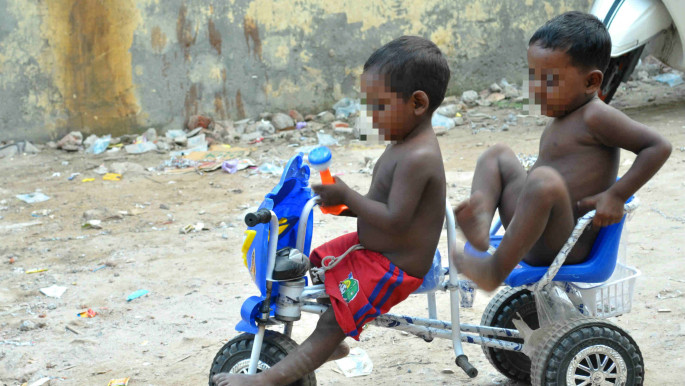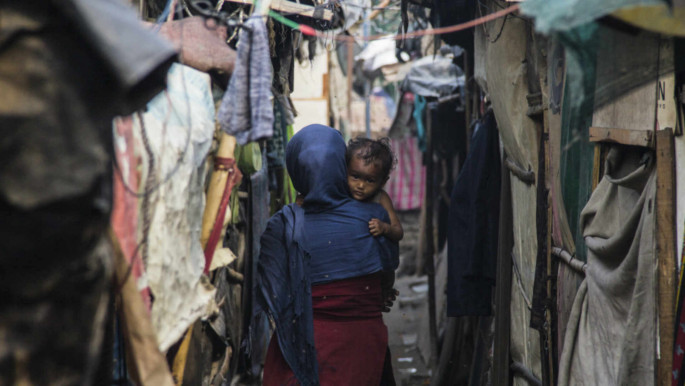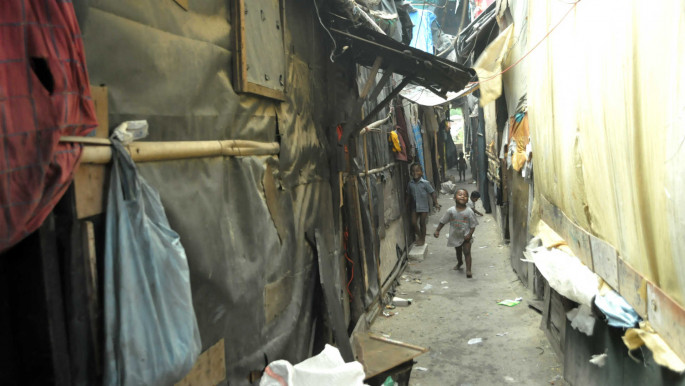India's Rohingya refugees living in fear for their lives
The four-year old is naked, her hair appears unkempt and greasy. "We don't have enough water to wash or bathe regularly," her father Abdul Kareem told The New Arab.
The 40-year-old Rohingya refugee has been living in the camp for the past five years. He runs a small, makeshift tea stall.
"She must be hungry," he said, pouring some milk tea into a plastic glass. Fareeda sits to drink, dipping a piece of bread in the brew. Scores of flies gather on her face and fingers, but again she seems to not care. The girl finishes her drink hurriedly, and runs off to rejoin her friends.
Nothing has changed for Kareem, the father of three children, since he sought asylum in India and registered with the UN's refugees' agency (UNHCR) ten years ago.
"I have no money to give my parents who recently escaped death in Myanmar," he said.
Kareem and his family are members of Myanmar's 1.1 million-strong Rohingya population.
 |
|
| [Click to enlarge] Rohingya children playing in a New Delhi refugee camp [The New Arab] |
Last month, when violence escalated in Myanmar's western Rakhine state, security forces burned down his parents' house - along with the entire village.
They then escaped to neighbouring Bangladesh, along with thousands of others.
A few days later, they called Kareem from a refugee camp in Bangladesh for help. He said he couldn't help them.
"What can I offer? I am already struggling to feed my family here."
Stateless: Rohingya refugees
Tens of thousands of civilians have fled their homes in the past month after Myanma forces launched an armed crackdown against the ethnic minority population in Rakhine state.
"More than eighty-thousand fled to Bangladesh within [the first] ten days of September," said Vivian Tan, a spokesperson for UNHCR.
The United Nations, like many other human rights groups, considers the Rohingya one of the most persecuted minorities in the world. In 2016, more than 65,000 Rohingya fled Myanmar after a crackdown by the army in Rakhine state in October and November.
 |
Reportedly due to their Muslim identity, many Rohingya have faced difficult circumstances in India - some even facing violence |  |
The origins of this state violence lies in a 1982 Burmese law, which categorically states that the Rohingya are "illegal migrants" from neighbouring Bangladesh. Under this law, anyone wanting to claim citizenship needs to provide proof they have lived in Myanmar for 60 years prior to application. Many Rohingya applicants have said their paperwork was still denied - even with this proof.
As a result, more than half of Myanmar's Rohingya population have left the country. There are currently 1.2 million living in exile - including around 180,000 in India.
Trust deficit in India
In New Delhi's Darul Hijrat refugee camp there are around 60 refugee families currently living in truly appalling conditions. Most live on around $50 a month, and almost everyone is struggling to make ends meet by working part-time, menial jobs.
Najeer Ahmad, 22, lives in the Kalandi Kunj refugee camp in New Delhi with another 67 families. He told The New Arab he had been verbally harassed on numerous occasions because he wears a beard with a trimmed moustache.
"Last month upon asking my contractors for payment a number of people started harassing me," he said.
"One of them said refugees are a threat to India," he added.
Read more: Rohingya refugees in India fear 'illegal' deportation to Myanmar
By comparison, hundreds of Buddhist and Christian refugees in India live in rented rooms and run their own small businesses. Reportedly due to their Muslim identity, many Rohingya have faced difficult circumstances in India - some even facing violence.
 |
|
| [Click to enlarge] A child in a Rohingya refugee camp, New Delhi [TNA] |
On September 3, around 20 members of the right-wing Hindu nationalist group, the Gau Rakshaks, barged into a refugee camp on the outskirts of Mujeri village in Ballabhgarh - a small town to the south of New Delhi.
They attacked and abducted a number of male refugees, also tearing the clothes off two women who showed resistance.
The attack followed the sacrifice of two buffalos for Eid al-Adha. When villagers spotted the buffalos they confronted the refugees and threatened to kill them if they complained to anybody.
The Bhartiya Gau Raksha Dal is an extremist movement in India known for lynching people who hurt cows. They often stop trucks on the highway suspected of transporting cattle and are known for launching attacks against Muslim communities.
Double face
Indian intelligence agencies and the home ministry has repeatedly doubted Rohingyas' vulnerability. On April 3, Rajiv Mehrishi, then home secretary, discussed how to deport Rohingya immigrants in a government meeting.
In September, Minister of Home Affairs Kiren Rijiju stated: "I want to tell the international organisations, whether the Rohingyas are registered under the United Nations Human Rights Commission or not... they are illegal immigrants in India."
Such a statement sparked a serious backlash and criticism from Amnesty International, UNHCR and other rights groups around the world who stressed that India's move to deport 40,000 Rohingya refugees would not only violate the international principle of non-refoulement - forbidding states from forcibly returning people to the risk of human rights violations - but would also accelerate the protracted conflict.
 |
I want to tell the international organisations, whether the Rohingyas are registered under the United Nations Human Rights Commission or not... they are illegal immigrants in India. |  |
Many observers in India believe that current policy is inspired by Israel's "Right to Return", which grants Jews from all over the world the right to settle in the state of Israel. India's prime minister, Narendra Modi, said in June 2015 that India should remain a natural home for persecuted Hindus and they should always be welcome to seek refuge here.
 |
|
| [Click to enlarge] A child runs barefoot in a New Delhi refugee camp [TNA] |
"Hindu refugees from Pakistan and Bangladesh will be treated like any other Indian citizen," Modi said.
Implicit was how this ruled out other religions and ethnic minorites.
Last week, during a meeting with Myanmar's de-facto leader, Aung San Suu Kyi, Modi gave the smallest amount of attention to the issue of the Rohingya and their humanitarian crisis.
According to Ali Johar, a Rohingya student at Delhi University, religion is a major factor in India.
"The Rohingya welcome support from any country irrespective of religion, but when this support comes from a country that does not have good relations with India, it also creates problems for us," he said.
"We can't praise India too much nor can we criticise them."
Umer Beigh is an independent journalist from Kashmir. He is a graduate from Nelson Mandela centre for Peace and Conflict resolution, JMI, New Delhi.





 Follow the Middle East's top stories in English at The New Arab on Google News
Follow the Middle East's top stories in English at The New Arab on Google News


